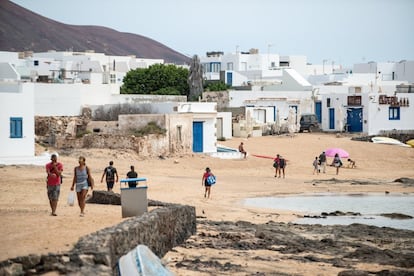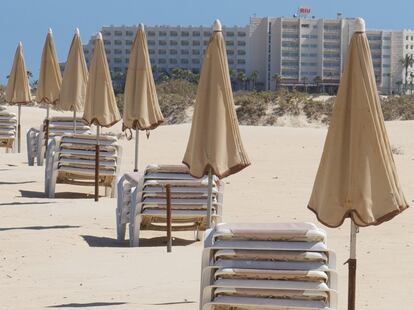UK, Germany add Spain’s Canary Islands to safe travel destination list
The move fuels hopes of saving part of the high season on the archipelago, which has seen a sharp drop in tourists due to the coronavirus pandemic

The United Kingdom on Thursday announced that the Canary Islands are being included on its list of safe travel destinations. The move came just hours after Germany had done the same, citing the “favorable epidemiological situation” in the archipelago, which lies off the coast of southern Morocco in northwestern Africa.
The news comes at a crucial time for the economy of the Canary Islands, where the high season for tourism is about to kick off. Britain and Germany are the leading source of tourists to the islands, where the warm weather allows for beach holidays over winter.
After a dismal summer, nobody is expecting to see the kind of tourist figures of recent years, but the sector hopes to save part of the high season thanks to these latest developments. Of the 13.1 million foreign tourists who visited the Canary Islands last year, more than half came from these two countries: 4.87 million from the UK (37.2 % of the total) and 2.51 million from Germany (19.1 %).
In response to the news, the airlines Condor, TUI, Ryanair, easyJet and Lufthansa have programmed 70 flights to the Canary Islands for next week, representing 13,000 seats, the news agency EFE reported.
No UK quarantines
Britain’s decision to include the Canary Islands on its safe travel list means that visitors will not have to observe a 14-day quarantine upon their return.
“The announcement by UK Transport Secretary Grant Shapps implies that citizens returning to that country from the archipelago will not have to self-isolate and that travel restrictions are being eliminated,” said the Spanish Tourism Ministry in a release.

Spain’s island destinations, which also include the Balearics in the Mediterranean, have had a special protocol in place since October 9. This includes a system for testing visitors both at the point of origin and at destination, to ensure that they are not forced to self-isolate back home.
Spanish Tourism Minister Reyes Maroto said that the ministry is considering extending the protocol to other destinations in mainland Spain. “Some regions have requested it, and each case will be collectively considered,” she said.
Foreign State Secretary Manuel Muñiz explained that safe travel corridors are being negotiated with a dozen countries that are significant sources of tourism to Spain. Under the scheme, there would be “additional safety measures such as diagnosis tests before the flights, both ways, at no extra cost to the tourists.”
Germany’s decision
Germany’s decision to take the Canary Islands off its international risk area list was made on Wednesday night, as reflected by the Robert Koch Institute on its website. This means that German tourists returning from the Spanish islands will not have to take a PCR test or self-isolate for a period that depends on the regional authorities of Germany’s Länder.
For most of the summer, the Canaries had been off Germany’s risk area list, but they were finally included on September 2 as a result of Spain’s second wave of the pandemic. Before that, in late July, the British government had advised against travel to Spain, including the islands, due to the worsening coronavirus situation.
The island tourism industry, which had been recovering slightly from the three-month national lockdown that ended on June 21, took a new nosedive during the summer. Industry sources estimate that only around 20% of tourism-related facilities remain open at the moment, and that occupancy is no more than 30% at any of them.
In early September, when Germany included the Canaries on its risk zone list, the 14-day cumulative number of coronavirus cases in the islands was 167.78 cases per 100,000 inhabitants, eight times higher than Germany’s at the time. Right now, the Canaries has the lowest incidence in all of Spain with 81.59 cases per 100,000, compared with the Spanish national average of 269.49.
The regional tourism chief, Yaiza Castilla, celebrated the “great news” while Jorge Marichal, president of the Spanish Confederation of Hotels and Tourist Accommodation (CEHAT) and of the hotel employer association of Santa Cruz de Tenerife, forecast that “it is still possible to save part of the winter season on the islands.”
Marichal said he hopes that other countries will follow suit. “We are still in time, and we must keep up the pressure.”
English version by Susana Urra.
Tu suscripción se está usando en otro dispositivo
¿Quieres añadir otro usuario a tu suscripción?
Si continúas leyendo en este dispositivo, no se podrá leer en el otro.
FlechaTu suscripción se está usando en otro dispositivo y solo puedes acceder a EL PAÍS desde un dispositivo a la vez.
Si quieres compartir tu cuenta, cambia tu suscripción a la modalidad Premium, así podrás añadir otro usuario. Cada uno accederá con su propia cuenta de email, lo que os permitirá personalizar vuestra experiencia en EL PAÍS.
¿Tienes una suscripción de empresa? Accede aquí para contratar más cuentas.
En el caso de no saber quién está usando tu cuenta, te recomendamos cambiar tu contraseña aquí.
Si decides continuar compartiendo tu cuenta, este mensaje se mostrará en tu dispositivo y en el de la otra persona que está usando tu cuenta de forma indefinida, afectando a tu experiencia de lectura. Puedes consultar aquí los términos y condiciones de la suscripción digital.








































